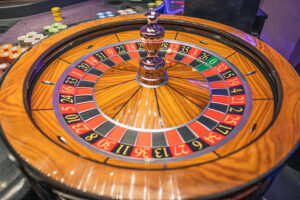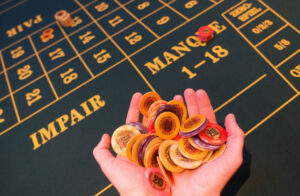
You’ve probably heard the expression in gambling – ‘the house always wins’. Usually, this phrase is spoken by those who are advising against any form of casino gambling. However, while this statement has a clear, negative connotation towards gambling, there is an element of truth to it. This element of truth is what allows casinos to be in business, stay in business, and thrive in business. But how is this actually the case, and is it always true of casino games?
Well, the answer has a few moving parts to it. To give you the most comprehensive answer possible, we will be discussing the popular casino game of roulette. Not only that, we shall be talking about the mathematicians who tried to beat the casinos offering roulette, while identifying the strategies and systems that they used.
Ready to dive into the world of probabilities and expand your knowledge on how they are connected to roulette? Let’s get started.
The House Always Wins – What This Truly Means
Once again, we’d like to stress that we shall be focusing on the game of roulette here. However, we should also point out that this house edge applies to all casino games, regardless of how they function. House edge on a fundamental scale indicates how the odds are skewed in favor of the casino offering these games. Typically, it is expressed as a percentage – and many different roulette systems have emerged over the years with the intention of beating this edge.
If you’ve seen a European Roulette table before, you’ll know that there are 36 numbered pockets, split evenly with 18 red and 18 black numbers. Logically, you’d think that gambling on red or black would suggest a 50% chance of getting it correct. But there’s a problem, this would give the house no edge whatsoever. That’s where the green zero pocket enters the picture, as this creates 37 total pockets, thus reducing the payouts for bets made on individual numbers.
The addition of this single pocket tilts things in the casino’s favor too, as it then gives an edge of 2.70% to the house. So, what are these systems that were created to beat this edge?
The Story Behind the Martingale Strategy
To dispel one popular myth right off the bat, ‘Martingale’ isn’t actually an individual. Instead, this term is pinned to 18th-Century France where several mathematicians, collectively created what has now been dubbed the ‘Martingale betting strategy’. Why France? Because this is where the game of roulette comes from, and much like the strategy, the first forms of roulette came to fruition in the 18th-Century.
As the popularity of roulette gambling surged following the release of this game, so too did the line of mathematicians who wanted to prove that they could ‘beat the game’. This paved the way for the birth of the Martingale strategy. In a nutshell, this strategy requires the gambler to double their bet for each spin of the wheel that doesn’t result in a win.
The gambler must always bet on something with close to a 50% probability, however, which is why it requires that you bet consistently on either red or black. The idea is that at some point you will win the bet, and thus double the original stake that started the sequence. Interestingly, the Martingale System is used in other areas such as investing and sports betting too. But there are problems with this system, just as there are with the D’Alembert system.
Details on the D’Alembert Betting System for Roulette
Unlike the Martingale system, which was devised by a collection of people, this one came from one famous mathematician – Jean le Rond D’Alembert. This French mathematician lived in the 1700s, and while roulette wasn’t actually a thing at the time, gambling most certainly was. So being a mathematician, D’Alembert put his mind to work in beating the odds.
Working from bets that have odds as close to ‘evens’ as possible, just like betting on a color in roulette, he created a strategy designed to win in the long run. His system actually shares similarities with the Martingale system, although there are subtle differences. While the Martingale system requires that you double your bet following each loss, the D’Alembert requires that you increase the stake by one unit for each loss.
So here, if you bet $5 and lost, you would increase the stake in $5 increments until you win. This prevents the stake sizes from becoming enormous following a string of wins, but it does mean that losses aren’t recovered immediately.
Do Such Systems Work and Have These Mathematicians ‘Cracked the Code’?
Although these systems have led to more consistent results in the past, sadly, neither of them carries the certainty of leaving the roulette table with a win. It’s also not like these are the only systems that have attempted to crack the code. Others like Paroli, Fibonacci, Andrucci and many other mathematicians have tried. Yet the best solution they have found is to create more of a ‘cash management’ system rather than a guaranteed system to win.
There is usually a distinct issue with all roulette gambling systems too, known as the ‘gambler’s fallacy’. This phenomenon suggests that the odds of hitting a certain color change the more that either red or black comes through in a sequence. Of course, this isn’t true, as the odds of hitting either red or black are exactly the same on each spin of the wheel. Even if the wheel has served up 10 red numbers in a row, the chances of hitting a red again are exactly the same as they were for the previous 10 spins.
These systems also fail to take into account that nobody has infinite cash to spend at the table. So, all it takes is a string of losses to wipe a player out, regardless of which system is followed. With all of this in mind, one thing is certain – these guys weren’t the first to try and solve the roulette wheel, and they won’t be the last.
More math whizzes will no doubt try and crack the code, and it will be interesting to see if anyone does achieve what’s currently regarded as impossible.
To get the best free roulette systems that really work, see the top 5 proven roulette systems and the video series below. It's the best 100% free information for winning roulette you'll find. It's written by professionals who are really earning a living from roulette. |


